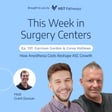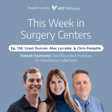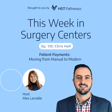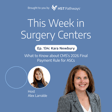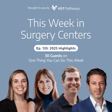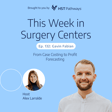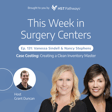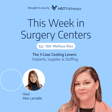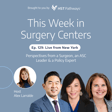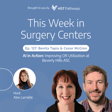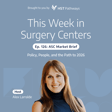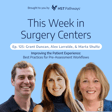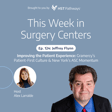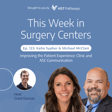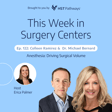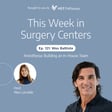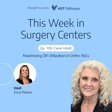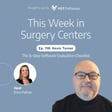Podcast Introduction
00:00:01
Speaker
Welcome to This Week in Surgery Centers. If you're in the ASC industry, then you're in the right place. Every week, we'll start the episode off by sharing an interesting conversation we had with our featured guests, and then we'll close the episode by recapping the latest news impacting surgery centers. We're excited to share with you what we have, so let's get started and see what the industry's been up to.
Guest Introduction: BJ DeMartini
00:00:27
Speaker
Hi, everyone. Here's what you can expect on today's episode. BJ DeMartini is the CEO at Excel Health, and he has been hard at work opening up new surgery centers in Hawaii and Washington. But BJ and his team are doing things a little bit differently. They are building these facilities with a true concierge approach and really leaning into the growing trend around medical tourism.
00:00:53
Speaker
I had a chance to sit down with BJ to talk through the specialties that they will offer, how he's sourcing physicians and attracting patients, the potential challenges they will face, and everything in between.
00:01:06
Speaker
And after our conversation, we'll switch to our data and insight segment. Today we'll cover case cancellation rates, including the average cancellation rate that ASCs are experiencing, tips for preventing cancellations, and how to identify trends and improve your rates. Hope everyone enjoys the episode and here's what's going on this week in Surgery Centers.
BJ's Medical Journey
00:01:33
Speaker
Hi BJ, welcome to the podcast.
00:01:36
Speaker
Hi Erica. It's nice to see you. Yes. Can you share with our listeners a little bit more about yourself and your healthcare experience? Yeah, sure. I've worked in healthcare for about 31 years now. It began as a combat medic in the army in 1992. And then that evolved into
00:01:56
Speaker
surgical coordinator position for an orthopedic spine and sports medicine group out of Philadelphia region. And from there, I really got to understand more of the musculoskeletal side of things and the surgery business really opened me up to learning, wanting to learn more. I stayed in school and maintained education while I was
00:02:19
Speaker
working as well. And then in 1999, I decided to start working in the health insurance industry, worked for Aetna Healthcare and sold insurance. And then transitioned over into the implant world where I sold orthopedic and spine implants for Depew Johnson and another well known orthopedic device company, Wright Medical was their name.
00:02:46
Speaker
And from there, I wanted to actually get more involved from a patient aspect. So I actually changed in 2006 and changed course and went back to school for a master's in Eastern medicine. And there I was in, I moved to San Diego for about four years and it was full-time master's degree course. And there I learned the techniques in acupuncture and
00:03:16
Speaker
more herbal and supplement information as well as nutrition.
Innovations in Surgery Centers
00:03:22
Speaker
And there was a variety of other techniques that are often used in Eastern medicine like cupping. And so I moved back to Philadelphia with my wife and we started a couple of clinics there in that region. As I also worked for the Philadelphia Flyers, I was their acupuncturist for three seasons while in Philly.
00:03:42
Speaker
and then transitioned over into getting back to helping the orthopedic and spine side of things and began working for a company up there that was based out of Tampa called Laser Spine Institute. And they specialized in ambulatory surgery centers and delivering spine techniques at a minimally invasive endoscopic
00:04:05
Speaker
level. And I was always into cutting edge technologies and delivering treatments to patients that was at the most advanced level. So if you're thinking of like a spine surgery, what are some ways that you could do a minimally invasive technique to address the same condition where others were maybe using older techniques?
00:04:27
Speaker
And so that was the inspiration to jump over into the ambulatory surgery center world. That was in 2010. And since then I've been working with ambulatory surgery centers and developing. And most recently, this is the exciting project we've had since is developing Excel Health and launching our new surgery center in Honolulu. Very cool. You just trying to think through everything you've done. You've been on the payer side, implants, patient side, direct care. So.
00:04:56
Speaker
you're very well versed in kind of all angles of what goes into healthcare. And I'm excited you had just mentioned Excel Health to really talk about your latest venture because like we just finished up a nine part series on how to open a new surgery center. So our listeners are pretty well versed on the overall process, but your focus and strategy is so different from what we typically see.
00:05:22
Speaker
So what is the concept behind these facilities you're building now? Yeah, so taking what we've learned, and we have a great group of partners involved here over the years, we've looked at the way surgery is treating patients and how we can advance our technologies.
00:05:43
Speaker
And now we're looking at it from redefining the aging experience, right? So if you look at all these surgeries that are applied, usually it's because there's either an injury or there's arthritis that's developed over the years. And there's a certain age group of individuals that as we age, we gravitate towards pain and look searching for treatments that help that. It's truly, it's an aging experience, right? So what we want to do is utilize these cutting edge surgical and non-surgical tech treatments.
00:06:13
Speaker
for musculoskeletal conditions but also in aesthetics as well so when you look at aging often you think of i'm looking in the mirror today and i have a blemish or aging wrinkle when i smile or something and it's a lot of people will go oh well it's just the part of the experience right and we thought well why not implement
00:06:33
Speaker
the merger of both of these specialties in medicine. So we now look at it as from the inside out. How can we change the way we think and feel about aging? And traditionally in America, it's a process where we don't really think about it, but once we're too old, we don't really fit in with the younger group anymore. And I think in other cultures, aging is a luxury.
00:06:57
Speaker
And so we want to look at it a little bit differently and how we can feel and stay active and youthful again. It's the market of anti-aging is what some call it, but we're looking at it as progressing and moving the way we think about how we're aging.
Minimally Invasive Techniques and Medical Tourism
00:07:14
Speaker
In order to do that, if we do need surgery, it's applying, again, minimally invasive techniques that don't actually cause collateral damage secondary to what is being addressed. And so that's important too, because if you're getting a surgery on your spine and there's collateral damage to important muscles of the spine that are used to hold you up or maintain activity, then that sets you back, right? And so we want to approach these things
00:07:40
Speaker
in a way that moves the body forward and stays active and pain-free, obviously. But if they want to come in and we're going to partner with a really cool aesthetics group that's actually coming out of Canada, and if somebody wants to address certain things on their skin, we're going to have that available too. So it's going to be a nice little merger.
00:08:03
Speaker
Nice. Yeah. So we had talked about this previously, but we're focusing on this idea of medical tourism and kind of this concierge medicine as well. What do you think really inspired your focus to go that direction?
00:08:20
Speaker
It's a couple of things. One is starting with the concierge aspect of medicine, delivering in hospitality and delivering an exceptional patient experience. And what that does is it naturally attracts people from a larger areas outside of where you're delivering.
00:08:38
Speaker
your treatment, right? So we can attract from a larger radius and we're not using the classic referral systems in large healthcare networks like providers and referral networks that are within their own enclosed system. Rather, we're using marketing to branch out and get ourselves and our brand out there. So from a tourism aspect, it allows us to use our standards to
00:09:06
Speaker
increase our outreach to other areas of the globe that may not have accessible healthcare or affordable or timely. These are the big things that if when I worked at the prior spine organization, we often saw a lot of Canadians come and for treatment.
00:09:25
Speaker
because they were stuck in a certain health system of their own where they had to wait very long amounts of time. So sometimes if they needed a spine MRI, the average wait time was about nine months. So we could allow them quicker access to come in and get health care as needed.
00:09:44
Speaker
Also, Asia is a great market and example as well, because we're located now in Honolulu, Hawaii, and that offers the ability for those in the Far East to come over on a shorter flight than it would take to get to the mainland. So countries like Japan, Korea, China, now can, once we are launching our branding campaigns and marketing campaigns, they'll see us and see that there's another opportunity to come in.
00:10:13
Speaker
And so we also allow for, again, I'm going to always hit the subject, but advanced technologies. And so when we are able to deliver the similar treatments or approach, but with advanced technologies, higher skill set of surgeons, naturally that will allow other countries, patients from those countries to
00:10:33
Speaker
to see what we're doing and compare it to what they're going through and then the timing of everything and how long the progression takes for them to get clearance or their conservative treatments worked up or even scans and images. So we can cut through a lot of that much quicker in a timely way, increase our, using our advanced technologies that again, I think compete in the global market.
00:11:00
Speaker
And it's also affordable. And since we're a surgery center company, we're comparing ourselves to hospitals and their costs, out-of-pocket costs for patients, that the monthly premiums are going up for insurance. But not just that, but deductibles and copays and co-insurances are also rising.
00:11:19
Speaker
Another cool thing that medical tourism does is it allows us to capitalize on our tranquil environment. So Hawaii, Honolulu, there's really, it's a beautiful place to go and recover after your procedure. We're also looking at other locations where we're expanding to in California, Southern California, specifically in LA and San Diego, and also in Florida. In Southern Florida, we're looking at a location right now.
00:11:48
Speaker
And so patients, again, they seek destination sometimes. And if you can just apply the economics to the location from a medical standpoint, then they'll choose to go to a nice place to go recover and get treatment. It also really impacts the local economy. So one thing we looked at in 2015 was we were headquartered out of Tampa Clearwater area.
00:12:15
Speaker
And we looked at how we impacted the local economy. We actually, through the medical tourism brought in about 300 million in revenue to the local restaurants, hotels. And so it's a big impact on that local area with what we're doing. So ultimately medical tourism empowers the patient. It allows them, if they
00:12:38
Speaker
don't feel that they're in good hands or they just wanted more options and they keep researching and finding and seeking. It empowers the patient to jump and go somewhere because they trust that they're going to have a better experience and a higher cutting edge technology that's going to get them to recover quicker and then back to their lifestyle, whether it's work or just simply contributing to their family. Many of these goals are applied when they're making their choices for where to go.
Patient-Centric Healthcare Approaches
00:13:08
Speaker
Yeah, it's really interesting because we're trying to focus more on the concept of that patients are consumers, right? They're not just, okay, your doctor makes a referral, this is where you go. There's not that conveyor belt of mindlessness where they don't get a say in the matter. So shifting the mindset of thinking about patients, they're buyers. They want to know
00:13:30
Speaker
They want to have the same experience as booking a hotel room or purchasing something online. Like they want that they're used to that experience. So why not lean in and make it super easy and comfortable and familiar for them. You mentioned this briefly and I want to go back to it because it's the part I'm most interested in without relying on physician referrals. Yeah.
00:13:52
Speaker
what does your marketing plan look like? I'm sure we could do a whole episode on that. Give me the high level, but I'm just dying to know how you plan on attracting patients. Yes. Did we sign a non-disclosure? No, I'm kidding. I'll hit it from an overarching concept, but the company we worked with prior was the best, without a doubt, in healthcare marketing.
00:14:15
Speaker
They were great at, and I'm going back to like 2006, seven, eight, when people were still trying to figure out the internet. Right. And in 2010, even when I was doing a search locally in the Philadelphia area.
00:14:29
Speaker
Like I was looking for a spine practice and boom, up pops later spine Institute. And it was not even the normal search. It was just a side ad that popped up on the right. And as I'm going, it kept flickering or doing something like it caught my attention. So I went and clicked it and.
00:14:47
Speaker
sure enough twenty minutes away was this clinic and so that i thought was remarkable i thought wow how did they know there's a lot of coding and other it things that i'm not very experienced in but it's part of the of the marketing structure and.
00:15:07
Speaker
and department. So basically, you're able to target a certain audience that you're looking for. If you compare a surgery center to a hospital, you automatically know that it's a different group of patients. They're typically healthier, right? So they don't have as many comorbidities that require overnight stays. And so you're trying to find those patients and attract them to
00:15:36
Speaker
with their conditions and treatments that they're looking for and then guide them to the practice. But the other part of that actually is the patient acquisition. Who's speaking with the patient on the other end? And why are they going to trust this company, Excel Health, with their care? And so it's the job and the role of those that are speaking with the patients to build value and especially in sharing and
00:16:04
Speaker
the information that we have about our surgeons. Sometimes we're finding these patients that aren't just injured from the last weekend. They've actually been in pain for two to five years, maybe longer, and have been putting it off.
00:16:20
Speaker
And then more recently, they've probably been trying to do other conservative treatments like injections and physical therapy. And ultimately, in the end, about 10% of these patients will say all of that fails and they need an option to get their life back, which would include a type of surgical option. And so we capture those patients who've probably already been through this type of system that I'm talking about
00:16:46
Speaker
And it's like a continuum of care that the patient has gone through from the time of their injury or pain. And so our job is just to share with them what our experiences are from a minimally invasive approach and how our surgeons are very highly skilled. It's likely build ships in a bottle. They work through tubes when they're working on the spine.
00:17:08
Speaker
We also have a really nice new robotic system that we use for total knees and total hips. And then next year it's going to incorporate a total shoulder system into the same robotic system. And so we can do this again in a surgery, we can do large joint replacements in our
00:17:30
Speaker
outpatient surgery center. And it requires a uniquely skilled set of staff. Our staff is exceptional because the patient needs to be comfortable and out of pain to do these types of procedures. They have to be really efficient and work well with the surgeon that's conducting the procedure. And so it requires a really efficient, unique team to incorporate all of those technologies into a little surgery center.
00:18:00
Speaker
But yeah, it's definitely exciting. Yeah. What do you think the primary challenges are that you'll face with patients traveling all over? Is it insurance, language barriers, accommodations? What are you anticipating?
00:18:18
Speaker
Well, it's definitely all of that. Unique to Honolulu is a very diverse culture there. So what was really fantastic about learning about all of our co-workers there is that everybody has a different background.
00:18:33
Speaker
And, and so many speak different languages. So when we have different areas like that, we'll have the ability to minimize the language barrier.
Insurance Navigation and Outpatient Facility Trends
00:18:42
Speaker
And then as it relates to insurance, yeah, we can work with most any insurance. If it's a type of like Kaiser HMO style, it has to stay within their network. We can still work with that patient. Again, because we're a surgery center, it allows us more flexibility in containing our costs.
00:19:01
Speaker
So we have a cash fee schedule that can apply for those that don't have necessarily the insurance that will cover it. We also have the access to loans, like a care credit.
00:19:13
Speaker
type of loan for a patient to help with their costs. And we can also bill out of network. So the patient will typically be used to or understand their own out of network costs associated with that. But for the most part in Honolulu, we're in network with most all insurers. And so we can work mostly with a lot of that. We don't have a tremendous gap other than it being an isolated island.
00:19:37
Speaker
out in the middle of the Pacific. So, so yes, so travel is going to be required for mainland and for Eastern Asians that want to travel over. We actually just recently captured a patient from Trinidad in the Caribbean. So he traveled all the way across from Caribbean to Hawaii and sought out our Dr. Jeff Rowe, spine surgeon.
00:20:03
Speaker
for his care. He comes from the Seattle market, is well known, was the minimally invasive director over at Swedish. And his skillset is exceptional when it comes to minimally invasive endoscopic techniques of the spine. And so he decided that he would go ahead and launch our Hawaii facility by partnering with Dr. Thomas Ngo, who's a neurosurgeon. So we have a crossbred neuro with orthopedic spine.
00:20:32
Speaker
trained surgeons there. And then we also have orthopedic pain management and we're surgical options as well as non-surgery options. And we're opening up the doors for other specialists like ENT and cardiovascular or interventional radiologists that want to also do like an office-based lab in one of our procedure rooms for those conditions. Gotcha. Awesome.
00:20:58
Speaker
So do you believe that facilities like this are the future of the outpatient industry or more just a luxury and niche category?
00:21:09
Speaker
Well, both. Good question. We certainly are looking at it from a luxury standpoint because we're attracting an aesthetics and cosmetics group that would also like to come in and traditionally that's a very nice appearance and facility. You usually get wowed, right? If you were to walk into a clinic like that and we want to merge that with ours. So even if it's a spine orthopedic condition,
00:21:36
Speaker
then we would love to have it really nice. So people feel, wow, I feel like I'm in a luxury setting, but yet it's not out of the pocket type of cash and they're going to be treated like they're in a luxury setting, right? The patient experience is going to feel luxury and also the appearance and the setting of it will feel that way too. So you can have both.
00:22:00
Speaker
You just have to put some TLC into the aesthetics of the building, right? And when you walk in, all of those patient facing areas should be nice. One of the first things I looked at when I walked in was the floor. And I just thought, why don't we get this thing shining really bright? But just little things that we can do to increase the experience, make it look nice. And patients absolutely will feel that. So until we're going to actually spend more money onto those
00:22:28
Speaker
areas and build out some of the nicer versions of what we would consider an interior design. Right now there's many things you can do just to upgrade it and then of course the number one thing is how you treat the patient in a concierge setting. So it's definitely something that
00:22:45
Speaker
You can, as managers and directors, can spend more time with their staff. And any opportunity when you're crossing paths with a patient throughout the day, that opportunity and that moment is a special time to connect with the patient. So we don't want to let those moments slip by. We want to make sure we address anything, even if it's a caretaker waiting for their loved one.
00:23:08
Speaker
offering them a refreshment. Is there anything we can get you just taking that extra time to stop and connect in that right then they might feel anxious and be waiting and that's expected, right? And so these are all the things that you can just do to make it feel like it's a luxury setting and a caring setting. Sure. Great answer.
Enhancing Patient Experience
00:23:28
Speaker
So last question for you. We do this every week with our guests. What is one thing our listeners can do this week to improve their surgery centers?
00:23:39
Speaker
I think that's it, right? What I just kind of finished in that last sentence, spend the time with your staff, making sure that they're not just walking by a patient, make eye contact, introduce yourself. Those connections last eternity and the patient will end up leaving and may not remember if they've had anesthesia necessarily, but their loved one will.
00:24:02
Speaker
And then the patient will remember all the prior experience up until the anesthesia kicks in that how they were treated is different from the way that they've been treated in other healthcare settings. And so that is to me is probably the most important thing you can do because it not only reflects how your brand or how your image will be outgoing, but usually there's four or five other people that are waiting to hear back from that patient of how well
00:24:32
Speaker
we did on our end. They're going to want to know how they feel. And there's five people waiting just because they probably need some help. They might need another type of treatment option and they want to hear a good experience before they make up their mind on where they go. So that's the kind of the organic
00:24:50
Speaker
referral or holistic referral way of going about it by delivering good care in that moment. So it starts with the staff and little touch points on every department of where that patient flows through and how they're treating each person. So I think that if you spend time with that's where you get your good marks on your patient experience surveys and ultimately a good patient experience survey can lead to a great
00:25:15
Speaker
quality outcomes survey. So it kind of extends on down the line and just, you know, improve your experience for the patients and connect with your employees. And I think everyone will ultimately feel that. Perfect. Thanks so much for coming on BJ. We really appreciate it. Thanks for having me, Erica. Really appreciate it. We'll talk to you soon.
Data Insights and Metrics
00:25:39
Speaker
Welcome to Data and Insights, where we sift through the stats to bring you the stories that matter. Now, if you're new here, this is the second time we've done this segment and the first time I use a different opening line, just as kind of cringy, but a different one. And then in two weeks, I have a third option coming. So after that, I'll need you all to tell me which one you liked the best before I choose my own. Anyway,
00:26:05
Speaker
HSC Pathways released a state of the industry report last year, highlighting best practices, key process steps, and KPIs for every step of the patient journey and for nearly every recurring administrative duty.
00:26:19
Speaker
Most importantly, using our own unique data set from our clients, we were able to extract data points so that anyone in the industry could compare themselves to their peers. To disclaimers, we only pulled data from clients who gave us permission and we omitted any extreme outliers. So after analyzing data from over 450 ASCs across the country, we were able to determine that on average, ASCs are experiencing a 20% case cancellation rate.
00:26:49
Speaker
Our data analysts derived this metric by dividing the number of canceled cases by the total sum of scheduled cases. And I did a little more research as well and found one published study from the National Library of Medicine. Their study was for hospitals though, so obviously different, but they analyzed 300,000 cases and found that the average case cancellation rate was 18%. So I thought that context was helpful just to add some color to the discussion.
00:27:19
Speaker
So why does this data point matter? When a case is canceled, regardless of the reason, it has a ripple effect on nearly every person at your facility, your vendors, the patients, of course, the patient's families. And case cancellations can have financial implications due to lost revenue opportunities, and it can directly impact your financial stability and financial projections for the year.
00:27:44
Speaker
One article that I read had suggested that case cancellations are the leading cause of underutilized ORs. And if that's true and you look at your OR revenue per minute, the numbers will add up very quickly. And then high cancellation rates also lead to frustration and stress amongst your team and of course will impact surgeon satisfaction as well.
00:28:07
Speaker
So if you're seeing higher cancellation rates than you'd like to, you first need to conduct a thorough analysis of the reasons behind the cancellations. Some of the most common reasons would be the patient's medical condition has changed. There were care coordination or vendor scheduling issues. Maybe a doctor or anesthesiologist cancellation could be patient related. So maybe they couldn't get a ride or got their times mixed up.
00:28:34
Speaker
It could be an equipment issue or something software related. So there are a lot of reasons why a case could potentially get canceled.
Reducing Surgery Cancellations
00:28:42
Speaker
There are also plenty of examples online of different cancellation categories, which you can then kind of tweak to work for your own surgery center.
00:28:52
Speaker
but you do need to first collect data on the reasons. And you should also interview your staff to get their input as well as their insight could be extremely helpful while trying to make sense of the numbers that you're seeing.
00:29:07
Speaker
Then from there, you want to try to identify some trends and extract some insights. For example, if you're seeing a high number of patients canceling due to forgetfulness, or maybe they ate when they weren't supposed to, perhaps you need to implement automated text reminders with pre-op instructions and arrival times. Or if you're seeing equipment issues creep up, maybe you just need to schedule more routine checks with your vendor.
00:29:30
Speaker
One study conducted by Biomed Central found that Mondays have a significantly higher cancellation rate than the other four weekdays.
00:29:40
Speaker
So identifying trends like this will help you put together an action plan. So for example, if you found the same pattern while your center is likely closed over the weekends, perhaps scheduling automated texts to go out on a Saturday or a Sunday could help overcome an issue like that. Now, of course, I don't want to oversimplify this. There are a lot of reasons cases get canceled, a lot of moving parts, and sometimes they're completely out of your control to a certain extent. But for reasons you can't control or influence,
00:30:10
Speaker
Turning your efforts into a QAPI study could also kill two birds with one stone. So again, we saw a 20% average cancellation rate. That one study on the hospital side saw an 18% cancellation rate.
Podcast Conclusion
00:30:23
Speaker
And if you track this metric at your ASC1, I would love to hear on LinkedIn, please leave a comment about what your average case cancellation rate is. And then I just hope this gives you some context as to how you might be performing compared to your peers.
00:30:38
Speaker
If you're interested in more data points and use cases, make sure to subscribe to our podcast so that you don't miss any upcoming segments, or you can always head to our website to check out the full State of the Industry report to get your hands on even more data.
00:30:54
Speaker
And that officially wraps up this week's podcast. Thank you as always for spending a few minutes of your week with us. Make sure to subscribe or leave a review on whichever platform you're listening from. I hope you have a great day and we will see you again next week.

